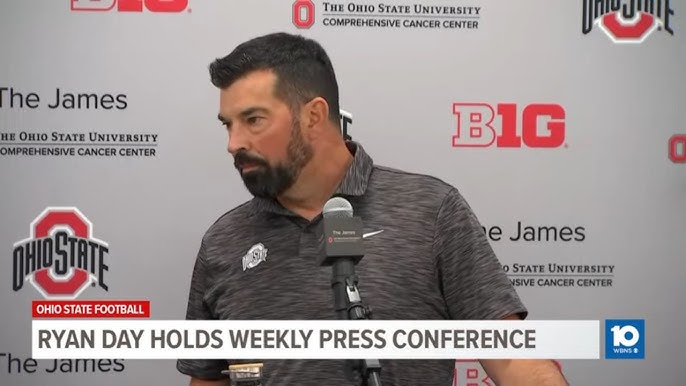As of October 2023, Ryan Day, the head coach of the Ohio State Buckeyes football team, finds himself at a critical juncture in his career. While he has achieved considerable success since taking over the role, he has recently decided to put contract negotiations on hold, a move that has surprised both fans and analysts alike. This decision has raised questions about the future of the program and what it might mean for the dynamics within college football.
### Background
Ryan Day took over as the head coach of Ohio State in 2018, following the retirement of Urban Meyer, who left behind a storied legacy. Day quickly established himself as a talented recruiter and strategist, leading the Buckeyes to multiple Big Ten championships and College Football Playoff appearances. Under his leadership, Ohio State has remained a powerhouse, competing at the highest level of college football.
However, the nature of college football has evolved, and so has the conversation around contracts and the expectations placed on head coaches. Day’s decision to pause any discussions regarding an extension of his contract comes at a time of intense scrutiny and expectations for sustained success.
### The Shocking Announcement
The decision to put contract talks on hold may at first seem surprising. Still, upon closer examination, it reflects a broader context involving both personal considerations and external pressures. Several factors have likely contributed to this choice, shedding light on the complexities of coaching at a high-profile program like Ohio State:
1. **Recent Performance**: While Day has had significant success, there are lingering doubts about the program’s performance against traditional rivals, especially the Michigan Wolverines. The last couple of years have been challenging, with losses in pivotal games that have intensified scrutiny on Day’s ability to lead the team at the highest level. This uncertainty could make negotiations awkward, as both sides will want assurances about future performance.
2. **Recruiting Landscape**: The college football recruiting landscape is fiercely competitive, and Day’s focus might need to remain squarely on securing top talent for Ohio State. With the impending changes in NCAA regulations and the growing influence of the transfer portal, a stable and vigorous recruiting strategy is essential. By pausing contract talks, Day can dedicate his full attention to recruiting, ensuring that Ohio State remains competitive not only on the field but also in securing top-tier talent for the future.
3. **Player Well-Being**: Day has emphasized the importance of understanding and supporting student-athletes in a world that has become increasingly complex. The mental and emotional well-being of players is paramount, particularly during times of great pressure and expectation. By postponing discussions about his contract, Day may be signaling that the focus should be on supporting his players, ensuring they feel valued and understood amidst the challenges of college athletics.
4. **Future Aspirations**: There is also a possibility that Day is contemplating his long-term future, both personally and professionally. With whispers of potential vacancies in marquee programs, including the NFL, Day may be evaluating opportunities beyond Ohio State. By pausing contract talks, he may be taking a step back to assess his options and envision where he wants to go next—his loyalty to Ohio State notwithstanding.
5. **Pressure From the Athletic Department**: The Ohio State athletic department holds high expectations for its football program, which is a significant source of revenue for the university. Unquestionably, Day has been under pressure to deliver results, and this pressure could be dissuading the administration from extending a contract prematurely. Both parties might prefer to wait until the season concludes and performance metrics are clearer before entering discussions.
6. **The Impact of NIL and Player Rights**: The introduction of Name, Image, and Likeness (NIL) agreements has altered the landscape of college athletics dramatically. Coaches and programs are navigating the implications of these changes, and Day may want to reassess how NIL impacts recruitment and player retention before committing to a long-term contract.
7. **Changing Dynamics in College Football**: The recent shifts in college football, including conference realignment and debates about the future structure of college athletics, have created a volatile environment. Day’s decision to hold off on contract talks may reflect a desire to see how these changes play out and how they will affect Ohio State’s standing in the broader landscape of college football.
### Looking Ahead
The decision to pause contract negotiations is not merely a tactic but could represent a considered strategy on Day’s part. It serves as a reminder that even successful coaches face uncertainty in their careers and that their fates are intertwined with the performance of their teams, the expectations of fans, and the evolving dynamics of college athletics.
As the Ohio State football program moves forward, attention will be on how Day approaches the remainder of the season, handles recruitment, and ultimately navigates the future of his career at Ohio State. The pause in contract discussions is a storyline that will likely develop as the season progresses, and fans will remain eager for clarity around Day’s vision for the program and their potential future.
In the world of college football, change is the only constant. Ryan Day’s decision to halt contract negotiations is indicative of the broader challenges and complexities that coaches face in maintaining excellence and managing the heavy expectations associated with leading one of the nation’s most prestigious programs. Regardless of how this situation unfolds, the focus will remain firmly on the Buckeyes as they strive to reclaim their place among the elite programs in college football.


